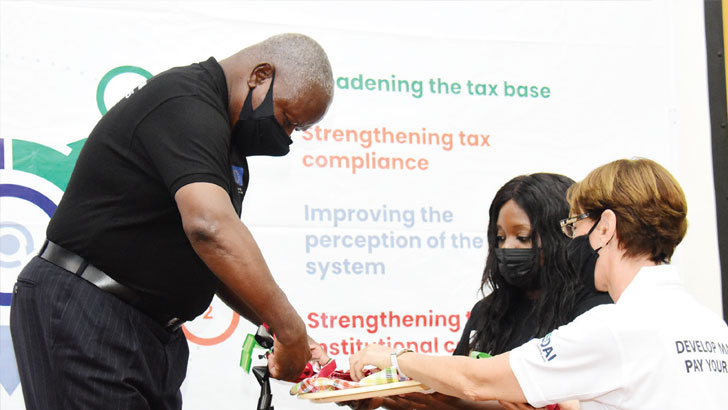Revenue strategy exposes tax loopholes
It has emerged that Malawi’s tax system is offering numerous tax incentives which at times tend to overlap, making it difficult to analyse as well as track their impact.
Malawi’ s maiden Domestic Revenue Mobilisation Strategy (DRMS) launched yesterday in Lilongwe also shows that the current tax policy in the country is “uncertain, unclear and not well documented”, thereby making it difficult to make informed business decisions.
The strategy says the local tax system provides a number of incentives such as tax holidays, capital allowances, industrial rebate schemes, and a long list of zero-rated and exempt products under the value added tax (VAT) Act.
Customs incentives alone, according to the strategy, are costing the country an estimated K60 billion each year.

Reads the strategy in part: “The incentives have largely not been able to attract and sustain new investments. Further, the tax incentive regime generally is not inclusive enough and not properly targeted, which has tended to compromise the equity, fairness, efficiency and effectiveness of the tax system.”
Over the years, Malawi Government has entered into agreements with international organisations or businesses which contain provisions that exempt them from paying taxes.
In 2016, it was estimated that the government lost about 0.27 percent of the gross domestic product (GDP) in tax revenue on imports due to such agreements.
Malawi’s domestic revenue ratio to GDP currently hovers around 14 percent, but such a rate is the lowest in the region and compared negatively to the sub-Saharan Africa average of 16 percent.
As such, the strategy aims to increase the ratio of the country’s domestic revenue to GDP by five percentage points from the current 14 percent to 19 percent in the next five years.
On insufficient tax policy consultation, the strategy also reveals that there is currently insufficient involvement of some stakeholders such as civil society organisations (CSOs) and the public in tax
policy design and implementation, stressing that their involvement in tax policy issues would enhance transparency in tax policy formulation and understanding of the impact of the revenue measures by citizenry.
Further, it says a consultative tax policy formulation process would enhance social contract and minimise the potential hostilities with the revenue collecting entities such as the Malawi Revenue Authority (MRA), Directorate of Road Traffic and Safety Services and the Department of Immigration and Citizenship Services.
Making her presentation yesterday on the new revenue strategy, Ministry of Finance deputy director for Revenue Policy Division, Chikaiko Chilima, admitted that the country’s tax system has what she termed “over-generous” incentives, but also cited other challenges such as policy instability, fragmented taxation amendments, ineffective taxation of informal sector, outdated tax legislation, unreliable taxpayer database, weak business analysis and intelligence.
On fragmented taxation amendments, she said the tax legislation in Malawi is amended on annual basis, but the main Acts are not timely consolidated to incorporate the new changes.
Chilima said: “As a result, the tax laws are fragmented, making it equally difficult for the MRA and the taxpayers to fully comprehend the changes and ensure uniform interpretation and enforcement of the tax laws, which in turn has negatively affected tax compliance.”
But she said the strategic focus of the strategy is to broaden the tax base, strengthen tax compliance, improve the perception of tax system, strengthen institutional capacity, and improve non-tax revenue
Chilima also said the strategy assumes that Covid-19 pandemic will subside over time and that the economy will return to stable growth, prudent management of public funds will become a norm and that unethical or corrupt practices will not be tolerated, among others.
But in an interview yesterday, Blantyre-based taxation expert Emmanuel Kaluluma, while concurring with Chilima, said tax incentives are tax expenditures which he described as “a necessary evil, especially to countries like ours”.
He said the incentives help to attract investors just like in any other country across the globe.
Kaluluma said: “We cannot completely do away with them [incentives]. But further, it is wrong to think that the investor will look only at tax incentives, they look at a total picture such political stability, foreign exchange controls, infrastructure and efficiency in government. Simply put, do not pass judgement on just tax incentives in isolation. Take a helicopter overview.”
Minister of Finance Felix Mlusu, who officially launched the strategy, said Treasury was mindful that the strategy has been launched at a time when the world is reeling from the effects of Covid-19 pandemic as well as the effects of climate change.
He also observed that currently, most businesses, both small and big, are struggling due to the tough operating environment.
The minister said: “This has also negatively affected performance of tax. Therefore, the time to make our tax system more efficient, transparent, fair and equitable is now when government requires resources to provide the required services to the citizens.”





